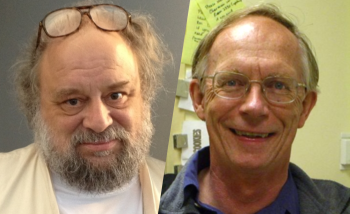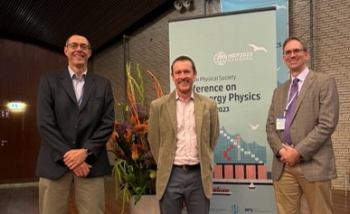Perimeter Associate Faculty member Roger Melko has been awarded this year’s CAP/DCMMP Brockhouse Medal.
Awarded by the Canadian Association of Physicists (CAP) and the Division of Condensed Matter and Materials Physics (DCMMP), the prize recognizes Melko “for his work on the theoretical understanding of many-body quantum systems through large-scale computer simulations.”
“Roger is a bold innovator and a creative thinker,” said Perimeter Institute Director Robert Myers. “His work has broad and profound implications, and his impact will only continue to grow. The Brockhouse Medal is a wonderful and well-deserved honour.”
Melko’s career has been characterized by a fascination with both computers and the exotic phases of matter where quantum effects dominate, known as quantum matter. Many of these forms of matter can only exist under extraordinary conditions, which are often difficult to create experimentally. Theoretical studies and computer simulations are key to unlocking the powerful properties of these phases of matter.
While still a master’s student, Melko and collaborators pioneered computer simulations that predicted new phases of matter, including a low-temperature spin ice state that is now commonly known as the “Melko state.” During his PhD at the University of California, Santa Barbara, Melko and his collaborators advanced a core technology to study quantum matter, known as quantum Monte Carlo methods, discovering another new phase of matter in the process.
He went on to pioneer both the conceptual study and the computer simulation of quantum phase transitions at the University of Waterloo and Perimeter Institute, where he is jointly appointed. One of Melko’s most influential discoveries came in 2010, when he used intuition gleaned from quantum field theory to develop an innovative approach that is now widely used in theoretical (and some experimental) studies of quantum matter. This approach has had vast applications, ranging from materials in physics and chemistry, to cold atomic matter, to quantum information systems, and even high-energy physics.
Starting in 2016, Melko pioneered an entirely new line of research that unifies artificial intelligence (AI), machine learning, and quantum many-body physics. Melko and Perimeter postdoctoral researcher Juan Carrasquilla demonstrated the ability of neural networks to “learn” fundamental concepts important for condensed matter and quantum information systems. This enabled tools and ideas from AI to be applied to the domain of computational physics, sparking a torrent of cross-disciplinary literature, workshops, and conferences.
Now, Melko leads the Perimeter Institute Quantum Intelligence Lab (PIQuIL), a research centre and training hub for future leaders at the intersections of AI and quantum systems. As a dedicated mentor for the next generation of scientists, Melko’s impact extends well beyond his field. Trainees from Melko’s lab are emerging as young leaders in their fields and are highly sought after in both academia and industry. In 2012, Melko was awarded the Young Scientist Prize in Computational Physics by the International Union of Pure and Applied Physics, followed by the CAP Herzberg Medal in 2016.
The Brockhouse Medal recognizes significant experimental or theoretical contributions to condensed matter and materials physics. It is named in honour of Bertram Brockhouse, whose outstanding contributions to research in condensed matter physics in Canada were recognized by the 1994 Nobel Prize for Physics.
“It is an honour to be awarded the CAP Brockhouse Medal,” said Melko, who holds a Canada Research Chair in Computational Many-Body Physics at the University of Waterloo. “I feel incredibly fortunate to receive this recognition from our Canadian physics community. My research would not be possible without the support of my many wonderful colleagues and collaborators. In particular, I would like to express my gratitude to the brilliant students and postdocs that I have had the opportunity to work with, and whose many contributions are acknowledged by this award.
“What excites me most moving forward is the opportunity that we have to integrate our traditional computational simulation frameworks with the programmable quantum devices currently emerging in laboratories around the world,” Melko added. “I believe that the future of scientific discovery in our field will be driven by simulators that hybridize traditional methods, with data-driven approaches that leverage quantum computing and machine learning technologies.”
About PI
Perimeter Institute is the world’s largest research hub devoted to theoretical physics. The independent Institute was founded in 1999 to foster breakthroughs in the fundamental understanding of our universe, from the smallest particles to the entire cosmos. Research at Perimeter is motivated by the understanding that fundamental science advances human knowledge and catalyzes innovation, and that today’s theoretical physics is tomorrow’s technology. Located in the Region of Waterloo, the not-for-profit Institute is a unique public-private endeavour, including the Governments of Ontario and Canada, that enables cutting-edge research, trains the next generation of scientific pioneers, and shares the power of physics through award-winning educational outreach and public engagement.
You might be interested in



